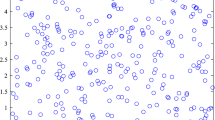Abstract
In this paper, an effective co-evolution algorithm strategy is presented to optimize the parameters of Radial Basis Function Neural Networks by incorporating the metropolis process of Simulated Annealing (SA) into the movement mechanism and parallel processing of Particle swarm optimization (PSO), namely HPSOSA, for rainfall-runoff forecasting model. Firstly, this paper is constructed the co-evolutionary algorithm, the HPSOSA algorithm is combined the advantage of fast computation of PSO, and the advantage of SA searching in the direction of the global optimum solution, helping PSO jump out of local optima, avoiding into the local optimal solution early and leading to a good solution quality. Secondly, the co-evolution algorithm is used to optimize the structures and parameters of RBF neural networks, namely HPSOSA-RBFNN. Finally, The developed HPSOSA-RBFNN model is being applied for daily rainfall-runoff forecasting in Liuzhou of Guangxi, China. The performance of HPSOSA is compared to pure PSO in these Basis Function Neural Networks design problems, showing the co-evolution algorithm strategy is more effective global search ability and avoid falling into local solution. Experimental results reveal that the predictions using the proposed approach are consistently better than those obtained using the other methods presented in this study in terms of the same measurements. Therefore, the HPSOSA-RBFNN model is a promising alternative for rainfall-runoff forecasting tool.
Access this chapter
Tax calculation will be finalised at checkout
Purchases are for personal use only
Similar content being viewed by others
References
Mehr, A.D., Nourani, V.: A Pareto-optimal moving average-multigene genetic programming model for rainfall-runoff modelling. Environ. Modell. Softw. 92, 239–251 (2017)
Bartoletti, N., Casagli, F.: Marsili-Libelli, S., Nardi, A., Palandri, L.: Data-driven rainfall/runoff modelling based on a neuro-fuzzy inference system. In: Environmental Modelling & Software (2017)
Chang, T.K., Talei, A., Alaghmand, S.: Choice of rainfall inputs for event-based rainfall-runoff modeling in a catchment with multiple rainfall stations using data-driven techniques. J. Hydrol. 545, 100–108 (2017)
Sinha, J.: A comparison of network types in artificial neural network-based rainfall-runoff modelling. Int. J. Appl. Res. Inf. Technol. Comput. 8(1), 41–50 (2017)
Makungo, R., Odiyo, J.O., Ndiritu, J.G.: Rainfall-runoff modelling approach for ungauged catchments: a case study of Nzhelele river sub-quaternary catchment. Phys. Chem. Earth 35(13–14), 45–62 (2010)
Wu, J.: An effective hybrid semi-parametric regression strategy for rainfall forecasting combining linear and nonlinear regression. Int. J. Appl. Evol. Comput. 2(4), 50–65 (2011)
Makungo, R., Odiyo, J.O., Ndiritu, J.G., Mwaka, B.: Rainfall-runoff modelling approach for ungauged catchments: a case study of Nzhelele river sub-quaternary catchment. Phys. Chem. Earth 35, 596–607 (2010)
Chadalawada, J., Havlicek, V., Babovic, V.: A genetic programming approach to system identification of rainfall-runoff models. Water Resour. Manag. 31(12), 3975–3992 (2017)
Vahid, N., Özgür, K., Mehdi, K.: Two hybrid artificial intelligence approaches for modeling rainfall–runoff process. J. Hydrol. 402, 41–59 (2011)
Qian, X., Huang, H., Chen, X., Huang, T.: Efficient construction of sparse radial basis function neural networks using L1-regularization. Neural Netw. 94, 239–254 (2017)
Talei, A., Chua, L.H.C., Quek, C.: A novel application of a neuro-fuzzy computational technique in event-based rainfall-runoff modeling. Expert Syst. Appl. 37, 7456–7468 (2010)
Eglese, R.W.: Simulated annealing: a tool for operation research. Eur. J. Oper. Res. 46, 271–281 (1990)
Shi, X.H., Liang, Y.C., Lee, H.P., Lu, C., Wang, L.M.: An improved GA and a novel PSO-GA-based hybrid algorithm. Inf. Process. Lett. 93(5), 255–261 (2005)
Chen, S., Cowan, C.F., Grant, P.M.: Orthogonal least squares learning algorithm for radial basis function networks. IEEE Trans. Neural Netw. 2(2), 302–309 (1991)
Lu, J., Hu, H., Bai, Y.: Generalized radial basis function neural network based on an improved dynamic particle swarm optimization and AdaBoost algorithm. Neurocomputing 152, 305–315 (2015)
Abedinia, O., Amjady, N.: Short-term load forecast of electrical power system by radial basis function neural network and new stochastic search algorithm. Int. Trans. Electr. Energ. Syst. 26(7), 1511–1525 (2016)
Acknowledgment
This work was supported the Natural Science Foundation of Guangxi Province under Grant No. AD16450003, and by the Guangxi Education Department under Grant Nos. 2013YB281 and YB2014467, and Key Laboratory for Mixed and Missing Data Statistics of the Education Department of Guangxi Province under Grant No. GXMMSL201405.
Author information
Authors and Affiliations
Corresponding author
Editor information
Editors and Affiliations
Rights and permissions
Copyright information
© 2018 Springer International Publishing AG, part of Springer Nature
About this paper
Cite this paper
Wu, J. (2018). Co-evolution Algorithm for Parameter Optimization of RBF Neural Networks for Rainfall-Runoff Forecasting. In: Huang, DS., Bevilacqua, V., Premaratne, P., Gupta, P. (eds) Intelligent Computing Theories and Application. ICIC 2018. Lecture Notes in Computer Science(), vol 10954. Springer, Cham. https://doi.org/10.1007/978-3-319-95930-6_19
Download citation
DOI: https://doi.org/10.1007/978-3-319-95930-6_19
Published:
Publisher Name: Springer, Cham
Print ISBN: 978-3-319-95929-0
Online ISBN: 978-3-319-95930-6
eBook Packages: Computer ScienceComputer Science (R0)




